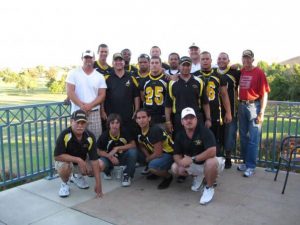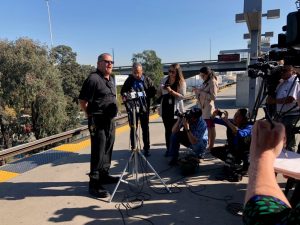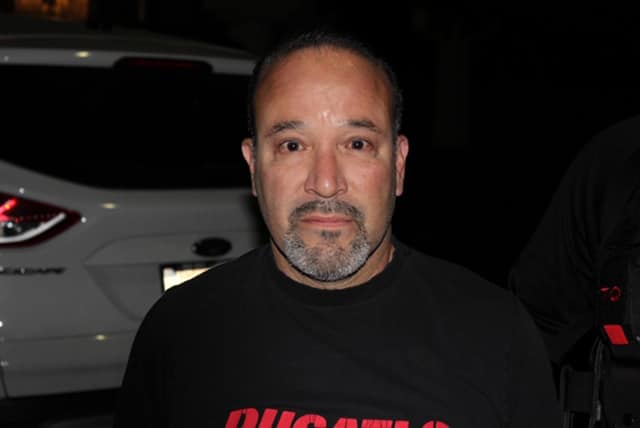Canciamilla retired on October 31
By Daniel Borsuk
With the clock ticking for the June 2, 2020 California Primary Election, Contra Costa County Board of Supervisors on Tuesday set a schedule to appoint a new County Clerk-Recorder by Feb. 4, 2020.
Supervisors voted 5-0 on Tuesday to follow a schedule to select a new Clerk-Recorder to replace Joseph Canciamilla who surprisingly retired on October 31 after serving one year of his second four-year term.
Canciamilla, who is on record as the nation’s youngest elected School Board Trustee when he was elected to the Pittsburg Unified School District Board in 1973 at age 17, was one year in into his second four-year term as County Clerk-Recorder when he announced his retirement.
Prior to his serving as Clerk-Recorder, Canciamilla had served as a State Assemblyman, County Supervisor, Pittsburg City Council Member and Pittsburg School Board Member.
In March 2013, out a pool of 19 candidates Canciamilla was selected by the board of supervisors to complete the term of County Clerk-Recorder Steve Weir, who had resigned after serving as clerk-recorder for 24 uncontested years.
Supervisors were pressed to establish a selection process and agreed to open recruitment on Nov. 8, close recruitment on Nov. 16, interview selected applicants and select a finalist on Jan. 21, authorize County Administrator David Twa to conduct a social media check and a criminal background check of the finalist and to obtain fingerprints and an economic disclosure statement (Form 700) from the finalist. The finalist will be appointed on Feb. 4.
No one spoke in opposition or in favor of the supervisors’ selection schedule, but supervisors spent some time on whether they’d accept applicants from outside the county and whether the county can attract quality candidates from within Contra Costa County or if the pool of candidates should emanate from outside the county.
“We’re going to get good local people,” predicted Supervisor Diane Burgis of Brentwood.
But District 4 Supervisor Karen Mitchoff warned “I’m not going to vote for some who applies for this position and maintains a rental.”
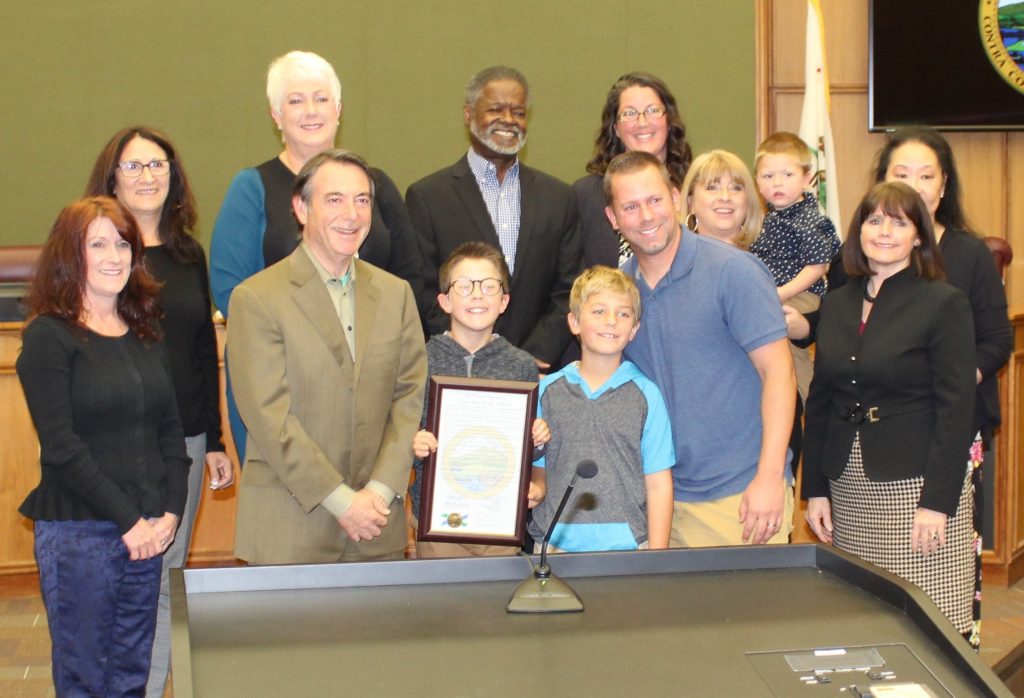
The Contra Costa County Board of Supervisors passed a resolution proclaiming November as Adoption Awareness Month in Contra Costa County at their meeting on Tuesday. In 2019, more than 150 children, including adoptions by former foster parents, family members and non-relatives had transpired. More than 1,600 families like the Nicole and Adam Davis of Concord receive adoption assistance and post-adoption support. Nicole and Adam are the foster parents of Chris, 10, Kavin, 8, and Ayden, 2. Children and Family Services in Contra Costa County offers concurrent planning, enabling the placement of children in a potential adoptive home while working with the birth family to help overcome challenges and support reunification efforts. Photo by Daniel Borsuk
Authorize Byron Airport Development Lease Negotiations
Supervisors gave county airport officials the green light to commence negotiations with Mark Scott Construction, Inc. to negotiate a long-term ground lease and development terms for three acres of vacant land at the north corner of Falcon Way and Eagle Court at the Byron Airport. The item was approved as a consent item.
The Airport Division of the Contra Costa County Public Works Department received a letter of interest from Mark Scott Construction Inc. to lease and develop the property for aviation use.
The business proposal will be presented before the Aviation Advisory Committee, the Airport Committee, and other stakeholders.
Revert 12-Year Housing Action in El Sobrante
Supervisors took the unusual action of unanimously taking a reversion of property designation that supervisors had approved nearly 12 years ago for a five-lot subdivision at Luise Lane at Hilltop Drive in unincorporated El Sobrante.
Since the developer and owner of the project site, Geoghegan Homes, Inc., has not met county requirements of installing road, drainage and other subdivision improvements as of Dec. 4, 2009 and has missed that extended deadline five times, ultimately to April 20, 2019, the county opted to exercise its reversion powers.
Now the property can only be developed into one house containing 7,000 square feet. Furthermore, the developer must go through a new county planning department review procedure, explained Slava Gospodchikov of the Contra Costa County Public Works Department.
The supervisors’ action did not please everyone especially Robert Johannessen, who lives across the street from the subject site and has seen rise of traffic accidents on Luise Lane when motorists take detours off nearby Interstate 80 when the freeway is jammed due to an accident. “It’s not a safe neighborhood anymore,” he said. Johannessen thinks any development on that site, even a 7,000 square foot house, will draw potential traffic problems to the neighborhood.
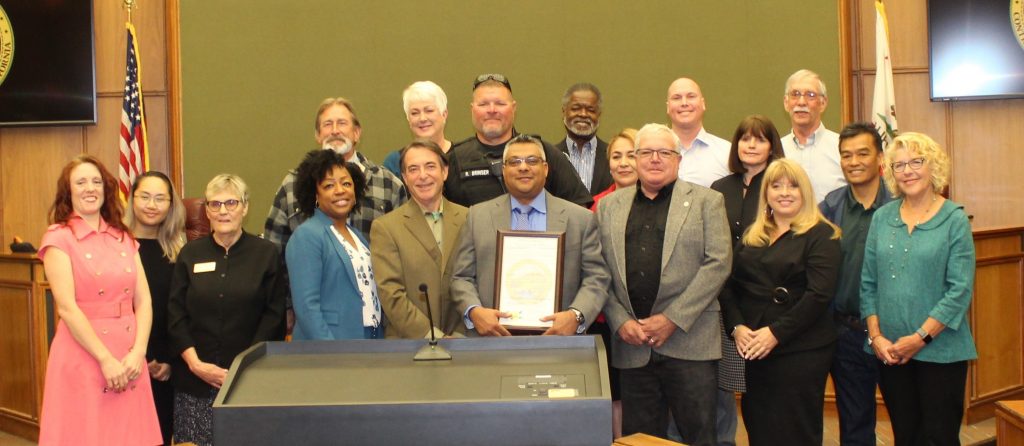
The Contra Costa County Board of Supervisors recognized four county entities for their contributions in combatting homelessness in the county at Tuesday’s board meeting. Supervisors passed a resolution recognizing November as Homelessness Awareness Month. The county has only 28 percent shelter capacity needed for single adults. In 2018, 6,924 persons accessed homeless services in the county. At the supervisors meeting, four awards were presented by the Council on Homelessness. Ken Rickner of Shower House Ministeries was named Outstanding Volunteer. Lito Calimlin was named as Outstanding Landlord Award. Chris Celio of the Home Center was named winner of the Rapid Resolution Program and the City of Martinez was named Outstanding Jurisdiction. Photo by Daniel Borsuk.
Other Board Actions
In other business, the supervisors approved five United States Department of Homeland Security Urban Area Security Initiative Grants contracts for the Contra Costa County Fire Protection District totaling $408,900. Those contracts include:
- $295,000 for the purchase of a hook lift modular transport vehicle.
- $10,000 for two 8,000 lbs. rated grip hoist rescue units.
- $24,900 for Weapons of Mass Destruction rescue Personal Protective Equipment such as butyl rubber gloves, Chemical, Biological, Radiological, Nuclear or Explosive filter cartridges and adapters.
- $38,000 for search and rescue listening devices; and
- $41,000 for the purchase of two search cameras.
By Doreen Mohler, Anne Loucks Chapter, NSDAR
Join the Anne Loucks Chapter of the NSDAR on Saturday, December 14th, at Union Cemetery in Brentwood to help place wreaths on veterans’ graves during the Wreaths Across America commemoration ceremony.
The ceremony begins at 9:00 am. See flyer for information to purchase wreaths, volunteer to help or to just attend. Community members of all ages are welcome.
This will be the fifth year that Wreaths Across America has been commemorated at Union Cemetery in Brentwood and it’s just an awesome way to honor our veterans. It will be a very feel good and positive event for our community.
Read MoreBy Luke Johnson
A man fell into the trackway – about 30 feet in front of an oncoming train – and a BART employee immediately thought:
“Oh, he ain’t gonna make it.”
However, the employee got on his knees and reached over the trackway – putting himself in harm’s way. He then grabbed the fallen man and pulled him to safety with inches to spare. This all happened in a matter of three seconds. (See BART video)
The hero: John O’Connor, 55, a 28-year Antioch resident and former assistant football coach for the Antioch High School Panthers.
He was working at the Coliseum Station after the Oakland Raiders game Sunday, Nov. 3 to provide extra supervision for the overflowing postgame crowd – which was needed to say the least.
“That’s what I’m here for,” O’Connor said. “God was with us at that moment.”
“It seemed a lot slower than it actually happened (on video),” said O’Connor to the media. “He came to the side, I figured he wasn’t going to make it so I grabbed him and pulled him up to the platform. That’s what we do. We got foreworkers, train operators, station agents who deal with this on a daily basis. We preach safety, and we practice it.”
He added that it doesn’t sound right to be called a hero, because people in the military, police and fire department save lives all the time and he doesn’t believe he belongs in that category.
Although he may not identify as a hero, this Thursday the Raiders will honor him as one. The team will host him in front of the Thursday Night Football audience as this week’s “Hometown Hero.”
BART said the young man who stumbled onto the trackway was intoxicated.
After O’Connor pulled the young man to safety, he lifted him from the ground, embraced him with a hug and said, “It’s OK.” Meanwhile, other BART riders cheered for O’Connor for saving the young man’s life.
The moment was captured on video and posted to Twitter – which quickly went viral and can be seen, here.
The story has been all over the news and has even garnered national attention. O’Connor said if it weren’t for that video, many people would not have known what happened, and it would have become “just another good drinkin’ story.”
During a press conference, O’Connor stated, “A lot of times, people see us, and they don’t understand what we’re doing and what we’re going through but when something like this goes down, we rise to the occasion. Whether it’s the ’89 (Loma Prieta) Earthquake, the Giants World Series, you name it, BART’s been here for the Bay Area, and what we do is we try to get people where they need to be.”
Read More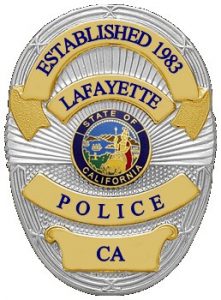 By Jimmy Lee, Director of Public Affairs. Contra Costa County Office of the Sheriff
By Jimmy Lee, Director of Public Affairs. Contra Costa County Office of the Sheriff
On Thursday, October 31, 2019, at about 8:30 PM, Lafayette Police Officers were dispatched to a report of a home invasion robbery that happened on the 1300 block of Martino Road in Lafayette.
The incident involved three suspects who were armed with a pistol. One suspect apparently knocked on the front door, while two others hid. When a resident opened the door, he was assaulted and forced back inside. The suspects went through the house, stealing valuables and personal items. The suspects were in the home for approximately one hour before leaving with the victims’ BMW sedan.
The stolen vehicle was tracked to Oakland. Officers from the Orinda Police Department, assisting in the investigation, responded to Oakland and found the stolen vehicle abandoned.
One of the victims was transported to a local hospital. The other suffered minor injuries.
The investigation is ongoing.
Anyone with any information on this case is asked to contact the Lafayette Police Department at (925) 283-3680 or (925) 299-3234. For any tips, email: 94549TIP@gmail.com or call (866) 846-3592 to leave an anonymous voice message.
Read MoreBy Daniel Borsuk
On Friday, the Contra Costa County Board of Supervisors unanimously adopted a resolution ratifying County Administrator David Twa’s Sunday, Oct. 27 proclamation of the existence of a local emergency when the board of supervisors was not in session and could not be called into session immediately.
The supervisors’ action on Friday triggers the county’s application for federal and state funds for reimbursement for fire emergency costs for responding to fires that flared up in Crockett, Bethel Island, Morgan Territory, Oakley and other locations in the county that stretched the resources of the Contra Costa County Fire Protection District and Contra Costa County Office of the Sheriff and its Emergency Services Division.
The proclamation states: “Conditions of extreme peril to the safety of persons and property have arisen within the County, caused by a severe weather event commencing at 8 p.m. on October 26, 2019. The velocity and duration of wind, coupled with low humidity, is driving wildfires in locations causing power disruptions, tree falls and infrastructure damage, and necessitating evacuations; and that these conditions are or are likely to be beyond the control of the services, personnel, equipment and facilities of the County.”
Contra Costa County Emergency Manager Rick Kovar said while the supervisors’ action sets in motion the application for federal aid that will reimburse the county for 75 percent of the costs and state aid for 22 percent of the costs, the county will have to pick up the remainder of about 2.5 percent of the Oct. 26 emergency expenses.
Kovar said as of Friday a total cost figure has not yet been compiled for the Oct. 26 fire emergency activities and probably won’t be revealed until perhaps Nov. 8
“It was a very collective effort by all parties,” said CCFPD Chief Lewis Brossard, who noted the outbreak of five fires around the county occurred about the time firefighters were cleaning up from a major blaze at a three-story building in downtown Walnut Creek. Concerning the Office of the Sheriff, Chief Brossard remarked “pretty spectacular work.”
“The county prepares for emergencies,” said County Administrator David Twa. “Our teams did the work they were trained to do. We are grateful that there was no loss of human life. We will continue to support residents and encourage you to stay prepared.”
“You were so prepared,” said District 3 Supervisors Diane Burgis of Brentwood. “I’m very proud of Contra Costa County. You did a very good job. We all came together.”
“The weather conditions were such that there were a series of fires one after another that led to evacuation orders in multiple parts of the county on that day alone,” said Board Chair John Gioia of Richmond. “Throughout the local emergency, Con Fire and other fire district firefighters, Sheriff’s Office, county departments’ employees and other partners including the National Weather Service, worked diligently to coordinate in the county’s Emergency Operations Center.”
Read More By Scott Alonso, Public Information Office, Contra Costa County District Attorney
By Scott Alonso, Public Information Office, Contra Costa County District Attorney
On Thursday, Oct. 31, 2019, defendant Ramiro Jimenez-Osorio of Richmond (73-years-old) pleaded guilty to two felonies for his repeated sexual assaults against two minor Jane Does under the ages of 14. The assaults occurred on multiple occasions from 2012-2015. After the victims in this case reported the improper conduct committed by the defendant, he fled prosecution and arrest to El Salvador.
On October 31, 2019, the Honorable David Goldstein in Department 6 sentenced the defendant to a term of 15 years to life in state prison. The defendant was previously convicted of a felony sexual assault of a minor in 2007. The prior conviction was charged as an enhancement.
“I want to emphasize how important the work of the Richmond Police Department was to successfully bring this case to a just resolution. RPD detectives and officers never gave up on seeking justice for the victims. Their work led the defendant to come back to the United States after years abroad in El Salvador,” said Deputy District Attorney Jay Melaas. DDA Melaas prosecuted the case on behalf of our Office and assigned to the Sexual Assault Unit.
To protect their confidentiality, our office does not release the name or age of the victim, or their relationship to a defendant.
Case information: People v. Ramiro Jimenez-Osorio, Docket Number 05-190838-3
Read MoreRenter lied about reason for renting Airbnb home.
By Jimmy Lee, Director of Public Affairs, Contra Costa County Office of the Sheriff
The Orinda Police Department and the Contra Costa County Office of the Sheriff continue to investigate a shooting that occurred on the 100 block of Lucille Way in Orinda on Thursday, October 31, 2019, at about 10:50 PM.
Orinda Police Officers, along with law enforcement officers from throughout the county, arrived on scene and found a house party with over 100 attendees. The party-goers apparently came from throughout the Bay Area for the Halloween event, which was advertised on social media. The party took place in a home that was found on a short-term rental website.
According to the Associated Press, the home was rented by a woman who “lied to her Airbnb host, saying she only needed a place to keep her family members away from wildfire smoke”.
Arriving Officers found a highly chaotic scene that included gunshot victims, injured party-goers, and numerous people fleeing the scene. Officers triaged the victims, cleared the location for safety and safeguarded the crime scene. Law enforcement officers found three gunshot victims who were later pronounced deceased at the scene. Another died at the hospital.
The victims are identified as 22-year-old Tiyon Farley of Antioch, 24-year-old Omar Taylor of Pittsburg, 23-year-old Ramon Hill Jr. of San Francisco/Oakland and 29-year-old Javin County of Sausalito/Richmond. An additional victim has been pronounced deceased at a local hospital. She is identified as 19-year-old Oshiana Tompkins of Vallejo/Hercules. There are now a total of five fatalities in this shooting.
Several other victims were transported to local hospitals by ambulance, while some victims transported themselves to the hospital. The injured suffered from gunshot wounds and injuries sustained while fleeing the scene.
A number of law enforcement agencies from the Bay Area assisted during the initial response as well as during the ongoing investigation. These include the Contra Costa D.A.’s Office and the Federal Bureau of Investigation.
The Sheriff’s Office Forensic Services Division Crime Lab responded to the home to process the scene. Two firearms were located in the house. The Crime Lab is analyzing the weapons to determine if they were used in the shooting or any other crimes. Numerous shell casings found at the scene are being processed and analyzed by the Crime Lab.
The investigation into this incident is ongoing with numerous interviews of witnesses and the analysis of evidence. The suspect is still outstanding.
Orinda Police Officers were yesterday called to the house at 9:19 PM and 10:25 PM regarding a noise complaint. At 10:48 PM, an officer was headed to the home to investigate the calls. The initial reports of shooting came in around 10:50 PM.
Anyone with any information on this case is asked to contact the Orinda Police Department or Office of the Sheriff at (925) 646-2441. The Investigation Division can be reached at (925) 313-2600. For any tips, email: tips@so.cccounty.us or call (866) 846-3592 to leave an anonymous voice message.
Allen Payton contributed to this report.
Read MoreToday, Congressman Mark DeSaulnier (CA-11) announced that due to overwhelming interest in this week’s “Women in Leadership, Politics, and Society” town hall in Danville, the location has been moved to a larger venue in order to accommodate all attendees. The town hall will now be held at Charlotte Wood Middle School on Saturday, November 2nd at 1:00 p.m.
At the town hall, Congressman DeSaulnier will be joined by a panel of local leaders who will explore the most pressing issues facing women today, like achieving gender and economic equity in the workplace and society, overcoming barriers to women’s health care, and increasing the representation of women in government.
“Women in Leadership, Politics, and Society” Town Hall
Saturday, November 2nd, 2019
1:00 p.m. to 2:30 p.m.
New Location: Charlotte Wood Middle School
600 El Capitan Dr., Danville,
Doors open at 12:30 p.m.
This event is open to the public, press, and photographers.
To confirm your attendance, please RSVP online at https://desaulnier.house.gov/town-hall-rsvp or call (925) 933-2660. To request ADA accommodations or for more information, contact one of Congressman DeSaulnier’s offices in either Walnut Creek or Richmond.
Read More By Susan Shiu, Director, Contra Costa County Office of Communications and Media
By Susan Shiu, Director, Contra Costa County Office of Communications and Media
The Contra Costa County Board of Supervisors adopted a resolution at a special Board meeting today, November 1, 2019, ratifying the County Administrator’s October 27, 2019 proclamation of existence of a local emergency when the Board of Supervisors was not in session and could not immediately be called into session.
Contra Costa County issued a proclamation of local emergency due to severe weather conditions on Sunday, October 27, 2019 at 4:37 pm when County Administrator David J. Twa, as the Administrator of Emergency Services, signed the proclamation.
The proclamation states that “conditions of extreme peril to the safety of persons and property have arisen within the County, caused by a severe weather event commencing at 8 p.m. on October 26, 2019. The velocity and duration of wind, coupled with low humidity, is driving wildfires in multiple locations, causing power disruptions, tree falls and infrastructure damage, and necessitating evacuations; and that these conditions are or are likely to be beyond the control of the services, personnel, equipment and facilities of the County.”
Board Chair, Supervisor John Gioia, said, “The weather conditions were such that there were a series of fires one after another that led to evacuation orders in multiple parts of the County on that day alone. Throughout the local emergency, Con Fire and other fire district firefighters, Sheriff’s Office, County departments’ employees and other partners, including the National Weather Service, worked diligently to coordinate in the County’s Emergency Operation Center.”
The Supervisors all echoed this sentiment of pride in how the County worked together with multiple agencies and jurisdictions to keep residents safe and informed during an unprecedented local emergency affecting tens of thousands of Contra Costa residents.
“The County prepares for emergencies. Our teams did the work they were trained to do. We are grateful that there was no loss of human life,” says County Administrator David Twa. “We will continue to support residents and encourage you to stay prepared.”
To learn about and register for Contra Costa County’s Community Warning System, go to cwsalerts.com. Sign up to receive alerts, such as evacuation alerts, via voice, text and email. Follow @CoCoCWS, @CCCounty and other official sources on Twitter.
For safety and preparedness resources, go to https://www.contracosta.ca.gov/5435/Public-Safety-Emergency-Info.
Read More OAKLAND –Ruben Eric Calle has been charged with possession of child pornography announced United States Attorney David L. Anderson and Homeland Security Investigations Special Agent in Charge Tatum King.
OAKLAND –Ruben Eric Calle has been charged with possession of child pornography announced United States Attorney David L. Anderson and Homeland Security Investigations Special Agent in Charge Tatum King.
Calle, 54, of Concord, was charged in a criminal complaint filed October 29, 2019, and unsealed today. According to the affidavit of a task force officer and member of the Silicon Valley Internet Crimes Against Children Task Force filed in connection with the criminal complaint, Calle possessed more than 600 sexually explicit images of child pornography. Law enforcement agents found the child pornography when they executed a search warrant at Calle’s residence on July 11, 2018. The images found in Calle’s possession are alleged to include depictions of an adult engaging in sexually explicit conduct with prepubescent children, including an infant or toddler. Allegedly, the images also include depictions of sadistic and/or masochistic conduct.
The investigation into Calle’s conduct began in 2018 when the National Center for Missing and Exploited Children received two CyberTips. Based on the information provided, investigators traced the uploading of child pornography on a peer-to-peer service to Calle’s residence.
Calle was arrested today in Concord and made his initial appearance in federal court in Oakland before U.S. Magistrate Judge Donna M. Ryu. Calle’s next appearance is set for November 5 at 10:30 a.m. for a status and detention hearing before U.S. Magistrate Judge Kandis A. Westmore.
A complaint merely alleges that crimes have been committed and all defendants are presumed innocent until proven guilty beyond a reasonable doubt. If convicted, the defendant faces a maximum sentence of 10 years (20 years if the images depict prepubescent children), and a fine of $250,000, plus restitution for each violation of 18 U.S.C. § 2252. However, any sentence following conviction would be imposed by the court only after consideration of the U.S. Sentencing Guidelines and the federal statute governing the imposition of a sentence, 18 U.S.C. § 3553.
Assistant U.S. Attorney Jonathan U. Lee is prosecuting the case with the assistance of Jessica Gonzalez Rodriguez and Kathleen Turner. The prosecution is the result of an investigation by the Silicon Valley Internet Crimes Against Children Task Force, Concord Police Department, and United States Department of Homeland Security.
Read More








